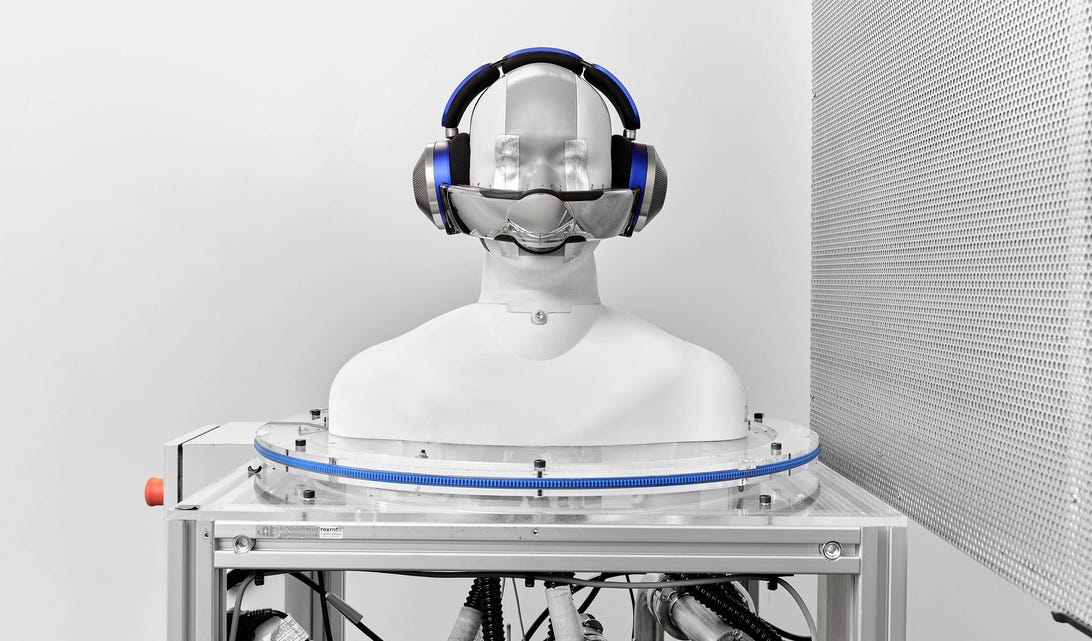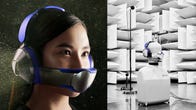
The Dyson Zone is set to ship this fall.
Dyson
Dyson’s new Zone air-purifying headphone looks like something you’d see in a dystopian sci-fi movie. But it’s a real device you’ll be able to buy sometime this fall, Dyson says.
For Dyson — a company that’s best known for its high-end vacuum cleaners — it’s the first foray into wearable technology. The Zone is a set of noise-canceling, over-ear headphones that “simultaneously deliver immersive sound to the ears and purified airflow to the nose and mouth,” addressing the “urban issues of air quality and noise pollution.” No word yet on pricing, but it seems safe to assume that these will cost more than your typical premium noise-canceling headphones from Bose and Sony, and maybe even more than Apple’s AirPods Max headphones.
There’ve been rumors that Dyson was working on such a device for years. Back in 2018, Bloomberg reported that Dyson was working on an air purifier-headphone combo and in 2020, Dyson applied for a patent for a new pair of headphones with a built-in air filter.
“Air pollution is a global problem — it affects us everywhere we go. In our homes, at school, at work and as we travel, whether on foot, on a bike or by public or private transport,” says Jake Dyson, chief engineer (and son of the company’s eponymous founder). “The Dyson Zone purifies the air you breathe on the move. And unlike face masks, it delivers a plume of fresh air without touching your face, using high-performance filters and two miniaturized air pumps. After six years in development, we’re excited to deliver pure air and pure audio, anywhere.”
Dyson says it created 500 prototypes over the course of the Zone’s six-year development.
Dyson
According to Dyson, the air-filtration component is a “non-contact” system, which means it doesn’t touch your face like a mask but rather sits just in front of it. “The compressors in each ear cup draw air through the dual-layer filters and project two streams of purified air to the wearer’s nose and mouth, channeled through the non-contact visor,” Dyson explains. “Sculpted returns on the visor ensure purified airflow is kept near to the nose and mouth and diluted as little as possible by external crosswinds.”
Dyson says that developing a non-contact solution was crucial in order to avoid the “discomfort and irritation associated with full-contact alternatives.” In the latest Dune movie, no one seems to be complaining too much about wearing filt-plugs in their noses to draw moisture from exhaled air back into their stillsuits for later drinking. But in the real world, people can have strong emotions about wearing anything on their faces, particularly masks.
Dyson says to test the Zone, its engineers used a breathing mannequin named Frank that was fitted with medical-grade mechanical lungs and sensing equipment that replicated human breathing patterns in a controlled chamber. That sensing equipment measured pollution levels within the nose and determined “the filtration efficacy of those particles, which would otherwise end up in Frank’s artificial lung.” The mannequin was named Frank because it reminded the engineers of Frankenstein, a Dyson rep told CNET.

Frank, the mannequin.
Dyson
Earlier this year, Razer released its cyberpunk-style Zephyr Pro air-purifier mask. Initially the company said it used N95-grade air filters, but later ran into some bad publicity when it had to retract that designation. Dyson doesn’t reference any medical-mask grades as far as air filtration goes, but does say that electrostatic filtration captures 99% of particle pollution as small as 0.1 micron, such as dust, pollen and bacteria and that a potassium-enriched carbon filter captures city gasses like NO2, SO2 and O3. How much that filter will cost to replace is still up in the air, but filters for its full-size air purifiers list for $70-$80, depending on the model..
On the audio side, Dyson says you can expect a premium listening experience with an accurate, neutral audiophile sound profile and proprietary advanced noise canceling. The headphones are also designed with comfort in mind, though Dyson hasn’t announced how much the headphones weigh or what their battery life ratings are with air filtration and noise-canceling on. Each ear cup houses two motors, and Dyson says they’re the smallest in any of its machines to date. The headphones connect via Bluetooth — no word on what version number — and can also be used to make voice calls.
As soon as we get our hands on a review sample later this year, we’ll provide more details about how the headphones perform and how they feel to wear around the New York City streets and subway system. We imagine we’ll get some interesting reactions from our fellow travelers.
The Dyson Zone air-purifying headphones key features, per Dyson
- Radical new format for delivering purified air and high-fidelity audio on-the-go
- Electrostatic filtration captures 99% of particle pollution as small as 0.1 micron, such as dust, pollen and bacteria
- Potassium-enriched carbon filter captures city gasses like NO2, SO2 and O3
- Contact-free air delivery visor channels two streams of purified air to the nose and mouth, engineered specifically for usage outdoors and in crosswinds
- The smallest in any Dyson machine to date, two motors sit in each ear cup and are the “beating heart” of the Dyson Zone air-purifying headphones
- Advanced ANC and a high performing neodymium electroacoustic system deliver rich, immersive audio that faithfully replicates audio as the artist or creator intended
- 15 undergraduate students from the Dyson Institute of Engineering and Technology worked on the Dyson Zone project, supporting disciplines as diverse as acoustics development, electronics and airflow systems.
- 3 ANC modes: Isolation, Conversation and Transparency
- Isolation mode: Highest level of active noise cancellation
- Conversation mode: Activates when you dip the visor –- automatically turns off the purification to conserve battery power and amplifies conversation
- Shipping this fall
